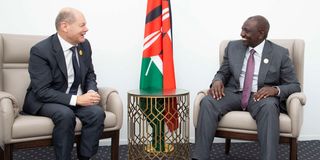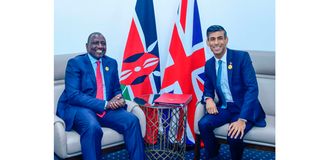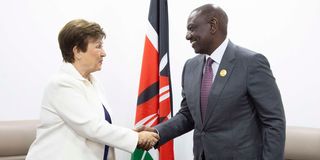Premium
Kenya to benefit from $30bn climate-focused investments, Ruto says

President William Ruto and the Germany Chancellor Olaf Scholz, witnessing the sign of declaration on Climate Development Partnership, in Sharma El-Sheikh, Egypt.
Sharm el-Sheikh, Egypt
Kenya has made investment deals in clean energy worth more than $30 billion to help mitigate the effects of climate change, according to President William Ruto.
“We are leaving Egypt with investments upwards of $30 billion. As you have seen, we have signed off agreements with the UK and with private sector developers and we are leaving here with firm agreements on the exploitation of geothermal resources, wind, solar resources, and shortly we will be on the highway on getting Kenya where we want her to be. Kenya is providing the leadership for Africa to be front and centre of the solutions to the challenge of climate change and not just a victim,” the President said as he concluded his two-day visit to Sharm el-Sheikh, Egypt, to attend the 27th United Nations Climate Conference.
Speaking after addressing a side event of African leaders on accelerating adaptation on the continent, Dr Ruto said recognition of Africa’s special needs may be difficult now but the journey must begin.

President Willliam Ruto (Kenya) with Prime Minister of the United Kingdom Rishi Sunak during The United Nations Climate Change Conference (COP 27), at Sharm el-Sheikh Congress Centre, Egypt.
“We need to have a comprehensive conversation about climate change that brings on board loss and damage. We have lost over two million head of cattle this year alone and we have 4.3 million people suffering the worst drought in 40 years. The loss and damage is real,” he said, adding that climate change has emerged as one of the greatest threats to life on earth.
“It is also a very serious challenge to humans’ well-being globally, with particular intensity on the African continent. The 6th Assessment Report of the United Nations Intergovernmental Panel on Climate Change (IPCC), published in August 2021, has singled out Africa as singularly vulnerable to climate and weather extremes.”
He pointed out that the vulnerability poses serious adverse repercussions for Africa’s precarious socio-economic systems, even though the continent’s countries cumulatively contribute only 4 per cent of average global emissions.
“It is imperative that urgent measures be taken to effectively cushion Africa’s peoples, their livelihoods, economies, and communities, and rapidly eradicate vulnerability. It is for this reason that accelerating adaptation is a matter of high priority throughout Africa. The escalation of global warming is worsening climate impacts, putting our countries at serious risk of adaptation limits being quickly overwhelmed, leading to unbearable loss and damage. Every slight increase in warming has far-reaching and often irreversible negative effects. Warming at rates in excess of 1.5°C could trigger multiple tipping points that would fundamentally alter the Earth’s climate systems.”
Separately, speaking at the inauguration summit of the International High-Level Panel on Water Investment for Africa, President Ruto said the NDC (nationally determined contribution) analysis report released by the United Nations Framework Convention on Climate Change (UNFCCC) Secretariat in October 2022 indicates that the world has fallen far behind in implementing agreed targets to minimise warming.
“As a result of this failure, the declared aspiration to keep temperature rise below 2°C has not been realised. Instead, the rate of warming has overshot the target, rising to 2.7°C. The UNEP’s Emissions Gap Report, 2022 corroborates this and confirms that given the insufficiency of current efforts, warming will further rise to 2.8°C. We are staring at a runaway warming effect whose consequences will certainly be unforgiving,” he said.
“Our global situation is dire, we must mobilise to do the right thing as a matter of urgency. There is no more room to ignore, evade or delay calls for substantial cuts in emissions, especially by the big emitters. Unless significant emission reduction is achieved rapidly, the adaptation gap continues to widen.”

President William Ruto held a meeting with the IMF Managing Director, Kristalina Georgieva on the sidelines of COP27 in Sharma el-Sheikh, Egypt.
Dr Ruto further said that in the one year since COP26 in Glasgow, extreme weather records have been broken on every continent.
“From the worst drought in 40 years currently ravaging the Horn of Africa region, including Kenya, to the devastating floods that hit Pakistan and more recently, Nigeria, and the worst European drought in 500 years, heat waves and wildfires in many parts of the globe, the litany of disastrous climate impacts continue. These calamities have been more pronounced and destructive in vulnerable countries, especially in Africa.”
Citing IPCC’s sixth assessment report which paints a grim picture, the President said that going forward if urgent climate measures are not undertaken now, the window for action is fast closing and the onus squarely falls upon the current world leadership to stand up as the generation that can be counted on to take hard decisions but do the right thing.
“We cannot afford to continue ignoring the urgent warnings of science with impunity. An effective response to climate change requires adequate and predictable financing, capacity building, and technology development and transfer,” he said, adding that climate finance remains the single most critical enabler in unlocking climate action.
“Between 2019 to 2020 a total of $11.4 billion has been made available to Africa for adaptation, against an estimated need of $579 billion in adaptation investment by 2030. Clearly, this level of financing falls far below what is required to build resilience in Africa. I call upon the developed parties to meet all their pledges. This includes doubling of adaptation finance agreed upon in Glasgow and the urgent implementation of the $100 billion commitment.”
According to the President, these funds are inadequate for the purposes of adaptation in Africa as well as covering loss and damage.
“The IPCC report emphatically affirmed that loss and damage is happening now, and I add that all the phenomena that characterise or inflict loss and damage have sadly become the lived experience of many African communities.
Failure to redeem these pledges, therefore, implicates the leadership of the developed countries in negligence with dire humanitarian consequences. This is an action moment, a financial moment, and a moral moment for global leadership. We must rise to meet it without flinching.”
The President called for the speedy capitalisation of existing climate finance mechanisms, both under the convention and the Paris Agreement.
“I also call for the development of innovative modalities to mobilise additional climate financing. The operationalisation of carbon markets under Article 6 of the Paris Agreement would go a long way in this respect. Finally, I emphasise the need for funding under these frameworks to be adequate, timely, and accessible in order to be effective.”
He is of the view that successful adaptation is not about making incremental or piecemeal investments. “Rather, it is about understanding, intending, and doing development differently. It is about systematically taking account of both present-day and future climate risks. Adaptation and development are inextricably linked and reciprocal, and credible adaptation action delivers considerable development outcomes.”





